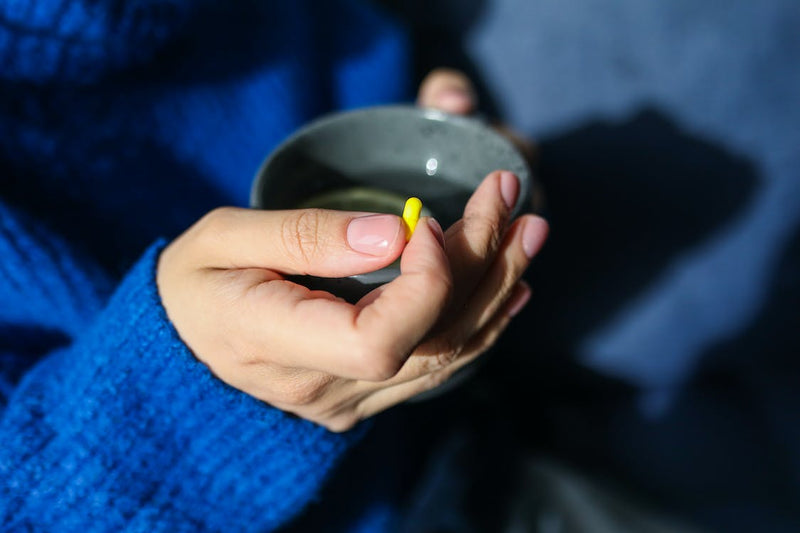What to Do If You’re Not Ovulating

Originally published 02/25/23. Updated for accuracy and relevancy on 08/27/2023.
Ovulation is an essential part of fertility. If you are trying to become pregnant, it is important to understand when you are ovulating so that you can increase your chances of getting pregnant. This guide will help you understand ovulation, how to know if you are ovulating, and what to do if you suspect you are not.
By Halle Tecco, MBA, MPH
Ovulation is the process by which your body releases an egg from the ovary. [1] This typically occurs once per menstrual cycle, around the midpoint of the cycle, but varies from person to person and cycle to cycle. After the egg is released, it’s ready to be fertilized by sperm and snuggle into the uterus for, hopefully, nine months.
Ovulation is controlled by a number of hormones that fluctuate throughout your cycle, including luteinizing hormone (LH) and follicle-stimulating hormone (FSH). [1] Ovulation can be influenced by various factors, including age, weight, and overall health.
What Is Anovulation and What Causes It?
Anovulation is the absence of ovulation, or the failure of the ovaries to release an egg. [2] This can happen for a variety of reasons, including abnormal hormone levels, unhealthy BMI, stress, premature ovarian failure, menopause, and certain medical conditions like PCOS. [2] Women who are anovulatory may have irregular or absent periods, which can make it more difficult to become pregnant. Learn how to track ovulation with irregular periods.
Can You Get Pregnant If You’re Not Ovulating?
It is generally not possible to become pregnant from intercourse if you are not ovulating. This is because if an egg is not released, there is nothing for sperm to fertilize and therefore pregnancy cannot occur. [1-2]
How To Know if You’re Not Ovulating
The good news is, it’s pretty easy to figure out if you are ovulating or not. There are several tactics you can use, including:
Period Tracking
The most defining feature of anovulation is irregular or missing periods. [2] Start writing down the length of your period as well as the flow for several cycles. If you have irregular periods, no periods at all, or your menstrual cycle is longer than 35 days, it may be a sign that you are not ovulating regularly. Heavy periods as well as painful periods could also be a sign. [3]
Ovulation Tests
Ovulation tests are an affordable and easy way to test for LH in your urine at home. If you never get a positive test during a cycle, it may be a sign that you did not ovulate. Calculate your potential ovulation date with our ovulation calculator.
Progesterone Tests
While ovulation tests help predict when ovulation is about to occur, a progesterone test can help confirm if ovulation did occur. A progesterone value greater than 3 ng/mL is evidence of ovulation. [4]
Cervical Mucus Monitoring
Before and during ovulation, you usually have vaginal discharge that looks like raw egg whites, also known as cervical mucus. If you don’t, this could be a sign of anovulation.
High Levels of Estrogen
High levels of estrogen can interfere with ovulation and may be a sign that you are not ovulating.
If I Have a Period, Am I Ovulating?
You may not even know you are not ovulating until you try, unsuccessfully, to get pregnant. It is possible to have periods, even regular periods, but not ovulate. But, these periods are not technically periods. [2] True menstrual bleeding only happens when the uterus sheds its lining because an egg isn't fertilized. So yes, you can still bleed and have what feels like a “period” without ever ovulating, but the bleeding is really abnormal uterine bleeding (AUB), or anovulatory bleeding. [2-3]
What To Do If You’re Not Ovulating
If you have a hunch that you are not ovulating, and you hope to get pregnant, there are a few things that you can and should do.
First, get support from a licensed healthcare provider. A care provider can review your health history and create a personalized care plan. Depending on your personal goals and health history, they may be able to suggest methods such as ovulation tracking, prescription of ovulation induction medication (drugs like clomiphene citrate or letrozole), test recommendations, or next steps tailored to your needs. Second, you'll want to find out the underlying reason for anovulation. There are tests and screenings that your healthcare provider may perform to rule out any underlying problems:
Fertility Testing
During perimenopause your ovaries are winding down until you no longer ovulate and have periods. Undergoing some fertility testing may be helpful for determining if you have healthy hormone levels, if you’re going through perimenopause, have low ovarian reserve, etc. Discover the symptoms of perimenopause.
Polycystic Ovary Syndrome (PCOS) Screening
PCOS accounts for 70-85% of abnormal ovulation because of the alterations to normal hormone levels it can cause. If you have PCOS, you’re not alone. About 1 in 10 women are affected and there are still ways to manage and treat PCOS if you’re TTC. [5]
Test Your Thyroid Levels
A healthy thyroid is not just important for ovulation, it’s also important for a healthy pregnancy. Different tests can measure your thyroid hormone levels to determine if you may have abnormal hormone levels or a thyroid condition.
Test Prolactin and Estradiol Levels
Hyperprolactinemia, or high levels of prolactin, can lead to anovulation.
Our at-home fertility test looks at many biomarkers, including Estradiol. Estradiol is the main form of estrogen in women and is produced by the ovaries. [6] It is one of the main sex hormones responsible for ovulation, which is vital to reproductive health and pregnancy in women. [6] After menopause, levels of estradiol decline significantly. Estradiol also plays a role in bone development, brain function, development of female secondary sex characteristics, and maintenance of the reproductive system. [6]
Seek Help
There are a lot of options for women who suffer from abnormal ovulation. Depending on your case specifically, some medications can help regulate your hormones to induce ovulation, or you could try fertility treatments such as IVF.
Be Your Healthiest Self
Most people suffering from anovulation benefit from lifestyle changes, such as getting to a healthy BMI, reducing stress, exercising regularly, avoiding recreational drugs, and getting the right nutrients. You have a greater chance of getting pregnant and carrying a healthy pregnancy if you’re healthy overall.
If you’re a cigarette smoker, it’s time to actively quit. Smoking can disrupt the menstrual cycle and lead to anovulation, making it more difficult to become pregnant. [7] Smoking can also reduce the number and quality of eggs, which can further decrease fertility. Not only that, but if you do get pregnant, the chemicals in tobacco smoke can damage the DNA in eggs, which can lead to chromosomal abnormalities and increase the risk of miscarriage. [7]
Quitting smoking is an important step for improving fertility and increasing the chances of a healthy pregnancy. If you are trying to become pregnant and smoke, it's important to talk to your healthcare provider about quitting and available resources to help you stop smoking.
Medications for Anovulation
Treatment for anovulation may involve prescription medications – like clomiphene citrate (Clomid) and letrozole – to stimulate ovulation. These medications work by regulating the hormones involved in the menstrual cycle and ovulation, and are usually in the form of a daily pill.
While success rate can depend on multiple factors, one study found that 77% of people with PCOS taking clomiphene citrate and 89% of people taking letrozole were able to ovulate. [8]
Supplements for Anovulation
Supplements can also be used to complement a healthy lifestyle. This can include:
A Prenatal Vitamin
You should be taking a prenatal multivitamin if you’re trying to get pregnant to prepare your body for a healthy pregnancy.
Myo-Inositol
Inositol Plus can help support ovarian health and egg health while promoting healthy hormone levels. Studies have shown that inositol may help regulate menstrual cycles and improve ovulation, specifically in women with PCOS. [9]
CoQ10
CoQ10 can help support egg quality. Emerging research suggests that maintaining healthy CoQ10 levels may support healthy egg quality, embryo quality, and pregnancy outcomes for women over 35.
As always, consult your healthcare provider before adding any supplements to your regimen.
Key Takeaways
- Ovulation is the process by which your body releases an egg from the ovary and is required to get pregnant from intercourse.
- Anovulation is when ovulation does not occur. This can happen for a variety of reasons, including hormonal imbalances, unhealthy BMI, stress, premature ovarian failure, menopause, and certain medical conditions like PCOS.
- Period tracking and ovulation tests are two affordable ways to find out if you’re ovulating or not.
- If you’re not already – it’s time to be your healthiest self. This means a healthy BMI, reducing stress, exercising regularly, avoiding recreational drugs, and getting the right nutrients.
- Supplements may also help with anovulation, check out Inositol Plus and CoQ10. And if you want to get pregnant, start taking a prenatal multivitamin.
Sources:
- Female Reproductive System. CDC. National Institute for Occupational Safety and Health. May 2023. URL.
- Anovulation. Cleveland Clinic. August 2021. URL.
- Jones K, Sung S. Anovulatory Bleeding. [Updated 2022 Sep 18]. In: StatPearls [Internet]. Treasure Island (FL): StatPearls Publishing; 2023 Jan-. Available from: https://www.ncbi.nlm.nih.gov/books/NBK549773/
- Infertility workup for the women’s health specialist. ACOG Committee Opinion No. 781. American College of Obstetricians and Gynecologists. Obstet Gynecol 2019;133:e377–84.
- Ding T, Hardiman PJ, Petersen I, Wang FF, Qu F, Baio G. The prevalence of polycystic ovary syndrome in reproductive-aged women of different ethnicity: a systematic review and meta-analysis. Oncotarget. 2017;8(56):96351-96358. Published 2017 Jul 12. doi:10.18632/oncotarget.19180
- Hariri L, Rehman A. Estradiol. [Updated 2022 Jul 11]. In: StatPearls [Internet]. Treasure Island (FL): StatPearls Publishing; 2023 Jan-. Available from: https://www.ncbi.nlm.nih.gov/books/NBK549797/
- Van Voorhis BJ, Dawson JD, Stovall DW, Sparks AE, Syrop CH. The effects of smoking on ovarian function and fertility during assisted reproduction cycles. Obstet Gynecol. 1996;88(5):785-791. doi:10.1016/0029-7844(96)00286-4
- Legro RS, Brzyski RG, Diamond MP, et al. Letrozole versus clomiphene for infertility in the polycystic ovary syndrome [published correction appears in N Engl J Med. 2014 Oct 9;317(15):1465]. N Engl J Med. 2014;371(2):119-129. doi:10.1056/NEJMoa1313517
- Pundir J, Psaroudakis D, Savnur P, et al. Inositol treatment of anovulation in women with polycystic ovary syndrome: a meta-analysis of randomised trials. BJOG. 2018;125(3):299-308. doi:10.1111/1471-0528.14754
Reach Out, We're Here
Have questions about your order or products? For the speediest answer, check out our FAQ section. Need something else? Come find us below.
Please keep in mind our regular business hours; Monday-Friday, 9am-5pm CT.
Customer Support
support@natalist.com
Press Inquiries
media@everlyhealth.com
Business & Partnerships
team@natalist.com
Affiliates + Influencers
team@natalist.com
Job Openings
Careers Page






















